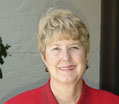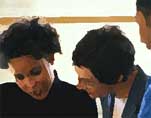Interview with Carol CollinsPresidential Award for Secondary Science Teaching, 1986 |
 |
During her 35 years as a science educator, Carol Collins started doing professional development as science chair in her school, moving on to districtwide or countywide professional development days, then presenting at state and national conferences. While working on her Ph.D., she taught classes and workshops for pre-service teachers. Now she serves as K–12 Science Consultant for the Hamilton County Educational Service Center in southwest Ohio.
How did you get started in providing professional development?
I started doing professional development initially within my department since I was the department chair. From there I started doing districtwide or countywide professional development days, either on programs we were having success with or on a particular topic. Then I got involved with the science teachers organization in Florida and started doing sessions at the state conference and eventually sessions at NSTA.
For several years, I conducted intensive summer workshops for the state. They were for primary teachers who didn’t have much background or confidence in teaching science. As I started working on my Ph.D., I began doing even more professional development, teaching classes and workshops for pre-service teachers. When I came to Ohio, after a year of high school science teaching, I took my current job where the primary focus is professional development.
When you were teaching, how did you juggle your teaching responsibilities with providing professional development?
Obviously it takes time to develop something. Some of the work we did through the district was developed in summer sessions where we were actually paid to create professional development on school time. Of course, that doesn’t mean you don’t do prep outside of that. But doing this really energized me. Yes, it was more time and effort, but it was just so rewarding and fun that it became my hobby.
What advice would you give to a teacher who wants to get involved in providing professional development?
It’s important to remember that, yes, it is different working with adults than with kids, but it’s not that much different. A lot of teachers don’t feel confident they can work with other teachers, but they really can. One piece of advice is to find someone who already does professional development and see if at first you could co-present. It’s easier to start that way instead of having to be totally in charge of figuring out what to present and how to present it. Starting out with somebody else builds a lot of confidence.
Also, when you go to conferences, really pay attention to the wonderful workshop presenters and the strategies they use. How do they get people to interact? How do they get people to discuss? How do they group people? What do they do to keep up energy? Also, go online and read about strategies for providing professional development. That will help give you a lot of confidence. We all know that teaching isn’t just about knowing the content. It’s also understanding how to help people understand and learn it. So, the more facilitation skills you can pick up on the better.
As I think back on the kind of professional development that has impacted me the most, I discovered providing professional development for others has been one of the most powerful professional development experiences for me. Going to workshops and presentations is fine, but actually getting involved in the process of science education will give you the greatest opportunity for growth, whether it be doing workshops, helping to write district assessment, working on state committees, or getting involved in your state professional organization. Not only do you put something into it, but you get a whole lot out of it.
When a teacher starts conducting professional development workshops, how can they establish a comfort level or trust with teachers?
With teachers in your own school or district, include them, and ask them about things they have expertise on. With teachers you don’t know, it can be difficult when you have a limited amount of time. You’ve got to make sure that what you're doing is very interesting, because it takes time to build a relationship with them. If you're doing a longer workshop, you can build that relationship within a day or so; then you can do things that might not on the surface seem quite so interesting because they'll trust you. It also helps if you are excited and don’t come across like you’re the keeper of all knowledge. Explain that this is something you’ve had a lot of success with and just want to share it with them.
Try to make it as much fun as possible—use all the carrots you can. It’s similar to teaching your own students. Until they are able to internalize the value of what they are learning, external rewards can serve as motivators. I try to give free graduate credits or stipends and keep things fun by having door prizes, treats, and contests.
How do you help teachers take the next step and try something new that will have an effect on their classroom practice?
In my experience, the professional development that is most successful in changing teachers’ teaching and attitudes is focused and intense, at least several days long, with ongoing follow-up. If participants can continue to support each other as learners, the workshop will be more successful. We have a group in Ohio that has developed a wonderful online way to follow-up where people talk to each other about what they’ve tried out and provide each other support between face-to-face meetings. A learning group can continue together in dialogue beyond the workshop without having to be on at the same time.
Another thing I try to do is show the teachers how what I’m suggesting actually works in classrooms. You might have teachers go into a classroom and observe, present a video of a classroom situation that is similar to their own, or even invite teachers who have experienced success to speak about it. I really believe that you can’t talk teachers into something. If we believe in constructivism—that you have to construct your own understanding—then teachers have to construct their understanding and acceptance of the new way of teaching. If they see someone they think is in a similar situation and see the students respond to that person’s way of teaching and learning, they just might change their practice. They might not if they just hear someone talk about it.
How can you help ensure that what teachers learn in professional development is implemented over time in the classroom?
If the district or school is initiating a professional development workshop, the teachers are likely to have support when they go back into the classroom. However, sometimes the teachers don’t like that, because the district decided to have teachers learn something that they weren’t necessarily ready for.
Other times, when there isn’t buy-in from the administration, there can be a gap between teachers’ understanding about good teaching and learning and administrators’ understanding about good teaching and learning. Anything you can do to ensure that the administrators of the building or district buy into the program is helpful. Some programs I’ve worked on have workshops for administrators so they will really understand the same ideas that the teachers are learning.
Try to get at least two people from a building to come to a workshop, so they can support each other in implementing what they’ve learned. When they go back and nobody else is buying into it, at least they have each other to talk to and work with. Also, if you're going to have a follow-up, make it as job-embedded as possible. In other words, don’t ask teachers to do assignments that will be on top of their regular workloads. Try to make the assignments be things they were going to have to do anyway but just in a different way, based on the focus of your workshop. For example, I’m running a workshop about inquiry in earth and space science. Some of the teachers found out that they won’t be teaching earth and space next year. One of the assignments is to write inquiry lessons in earth and space science. But, since that’s not what those teachers will be teaching, I’ll have them write an inquiry lesson in whatever subject they will be teaching. I try to give them work that will be directly useful.
As a provider of professional development, what sort of feedback do you like to get from your participants?
We have a standardized evaluation form that includes questions about participants’ satisfaction, fulfillment of expectations, and learning. Sometimes we have teachers reflect on changes in their understanding and willingness to try things before they come to the workshop and after completing the workshop. In the case of ongoing professional development, you also get anecdotal feedback on a continuous basis about what teachers have tried and how it worked. We have also been looking into ways to contact participants at some point after a workshop and have them provide evidence that they have actually tried to use some of the strategies.
What kind of feedback do you provide to participants?
Sometimes we build a session into the workshop where I observe teachers in their classroom. I make it very clear that it is not an evaluation to grade them on how well they are doing. I talk to them and, together, we decide what they want me to look at—student behavior, teacher behavior, questioning strategies, time on/off task, etc. After I observe, we have a debriefing about what I saw. Doing this type of observation is also helpful for me. In one case, I identified a teacher I invited to come back as co-instructor. Observing her classroom, I could just see that she would be great doing this.
How do you think science professional development can get “equal time” with reading?
We have done some work to “coat-tail” science with reading. We have a couple of teachers who wrote something called Picture Perfect Science, which is using children’s picture books to teach science inquiry and really integrate it. The science is completely integrated with the reading. You’re not simply teaching an inquiry lesson and then finding a book to read afterwards.
We’ve also conducted workshops that identify strategies that go across all the content areas. In the morning, we talk about the strategies and, in the afternoon, we apply those in a particular content area. For example, we might discuss using compare and contrast, reasoning, and predicting with students. Then we can talk about and model how these strategies can be applied in science, math, and social studies.
How do you think your experiences in providing professional development contribute to the advancement of science reform?
I hope that by modeling inquiry and interactive learning strategies in my workshops, the participants will not only hear about the nature of science and the importance of inquiry in learning science but will also have those experiences themselves. And, so, they will be more likely to become interested in and implement science reform.
Another way there seems to be an impact is what might be called the "ripple effect." Some of the participants—especially in the intensive, on-going workshops—have reported that as they experience increased success in implementing inquiry in their classrooms, some of their colleagues have become interested in trying new strategies.
If you have questions you would like to ask Carol Collins about her experiences
in providing professional development, contact her at collins_c@hcesc.org.

